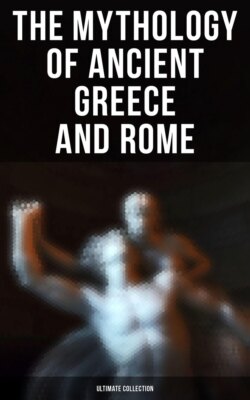Читать книгу The Mythology of Ancient Greece and Rome - Ultimate Collection - Homer - Страница 56
На сайте Литреса книга снята с продажи.
FABLE IV.
ОглавлениеIn the Silver Age, men begin not to be so just, nor, consequently, so happy, as in the Golden Age. In the Brazen Age, which succeeds, they become yet less virtuous; but their wickedness does not rise to its highest pitch until the Iron Age, when it makes its appearance in all its deformity.
Afterwards (Saturn being driven into the shady realms of Tartarus), the world was under the sway of Jupiter; then the Silver Age succeeded, inferior to that of gold, but more precious than that of yellow brass. Jupiter shortened the duration of the former spring, and divided the year into four periods by means of winters, and summers, and unsteady autumns, and short springs. Then, for the first time, did the parched air glow with sultry heat, and the ice, bound up by the winds, was pendant. Then, for the first time, did men enter houses; those houses were caverns, and thick shrubs, and twigs fastened together with bark. Then, for the first time, were the seeds of Ceres buried in long furrows, and the oxen groaned, pressed by the yoke of the ploughshare.
The Age of Brass succeeded, as the third in order, after these; fiercer in disposition, and more prone to horrible warfare, but yet free from impiety. The last Age was of hard iron. Immediately every species of crime burst forth, in this age of degenerated tendencies;30 modesty, truth, and honor took flight; in their place succeeded fraud, deceit, treachery, violence, and the cursed hankering for acquisition. The sailor now spread his sails to the winds, and with these, as yet, he was but little acquainted; and the trees, which had long stood on the lofty mountains, now, as ships bounded31 through the unknown waves. The ground, too, hitherto common as the light of the sun and the breezes, the cautious measurer marked out with his lengthened boundary.
And not only was the rich soil required to furnish corn and due sustenance, but men even descended into the entrails of the Earth; and riches were dug up, the incentives to vice, which the Earth had hidden, and had removed to the Stygian shades.32 Then destructive iron came forth, and gold, more destructive than iron; then War came forth, that fights through the means of both,33 and that brandishes in his blood-stained hands the clattering arms. Men live by rapine; the guest is not safe from his entertainer, nor the father-in-law from the son-in-law; good feeling, too, between brothers is a rarity. The husband is eager for the death of the wife, she for that of her husband. Horrible stepmothers then mingle the ghastly wolfsbane; the son prematurely makes inquiry34 into the years of his father. Piety lies vanquished, and the virgin Astræa35 is the last of the heavenly Deities to abandon the Earth, now drenched in slaughter.
